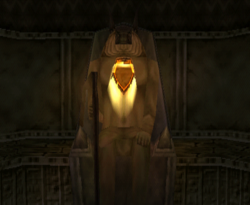Religion in Ancient Egypt: Difference between revisions
DansFriend (talk | contribs) No edit summary |
DansFriend (talk | contribs) No edit summary |
||
| Line 5: | Line 5: | ||
According to the book ''Lifestyles of the Pharaohs'', ancient Egyptian kings and queens, known as Pharaohs, were seen as Gods and Goddesses by their subjects.{{Gameref|MED2}}{{Gameref|MED2|The Professor's Lab|quote=Although viewed as Gods and Goddesses a Pharaoh's life was often a short and arduous affair.|author=''Lifestyles of the Pharaohs''}} | According to the book ''Lifestyles of the Pharaohs'', ancient Egyptian kings and queens, known as Pharaohs, were seen as Gods and Goddesses by their subjects.{{Gameref|MED2}}{{Gameref|MED2|The Professor's Lab|quote=Although viewed as Gods and Goddesses a Pharaoh's life was often a short and arduous affair.|author=''Lifestyles of the Pharaohs''}} | ||
The burial chambers in Consort tombs, such as the tomb of [[Princess Kiya]] found in Abu Simbel, housed statues of Gods | The burial chambers in Consort tombs, such as the tomb of [[Princess Kiya]] found in Abu Simbel, housed statues of Gods like [[Anubis]], [[Horus]], and [[Sekhmet]]. They were part of a mechanism that protected the sacrophagus of the buried person.{{Gameref|MED2|Kensington, the Tomb}} | ||
==References== | ==References== | ||
{{Reflist}} | {{Reflist}} | ||
Revision as of 17:56, 2 November 2024

Statue of the god Anubis in a tomb.
Ancient Egyptian religion was a system of polytheistic beliefs and rituals that formed a crucial part of ancient Egyptian culture.
According to the book Lifestyles of the Pharaohs, ancient Egyptian kings and queens, known as Pharaohs, were seen as Gods and Goddesses by their subjects.[1][1.1]
The burial chambers in Consort tombs, such as the tomb of Princess Kiya found in Abu Simbel, housed statues of Gods like Anubis, Horus, and Sekhmet. They were part of a mechanism that protected the sacrophagus of the buried person.[1.2]
References
- ↑
 MediEvil 2. Developed by SCEE Cambridge Studio. Published by Sony Computer Entertainment on April 21, 2000.
MediEvil 2. Developed by SCEE Cambridge Studio. Published by Sony Computer Entertainment on April 21, 2000.
- ↑ Lifestyles of the Pharaohs: "Although viewed as Gods and Goddesses a Pharaoh's life was often a short and arduous affair." in The Professor's Lab in
 MediEvil 2. Developed by SCEE Cambridge Studio. Published by Sony Computer Entertainment on April 21, 2000.
MediEvil 2. Developed by SCEE Cambridge Studio. Published by Sony Computer Entertainment on April 21, 2000.
- ↑ Kensington, the Tomb in
 MediEvil 2. Developed by SCEE Cambridge Studio. Published by Sony Computer Entertainment on April 21, 2000.
MediEvil 2. Developed by SCEE Cambridge Studio. Published by Sony Computer Entertainment on April 21, 2000.
- ↑ Lifestyles of the Pharaohs: "Although viewed as Gods and Goddesses a Pharaoh's life was often a short and arduous affair." in The Professor's Lab in
| |||||||||||||||||||